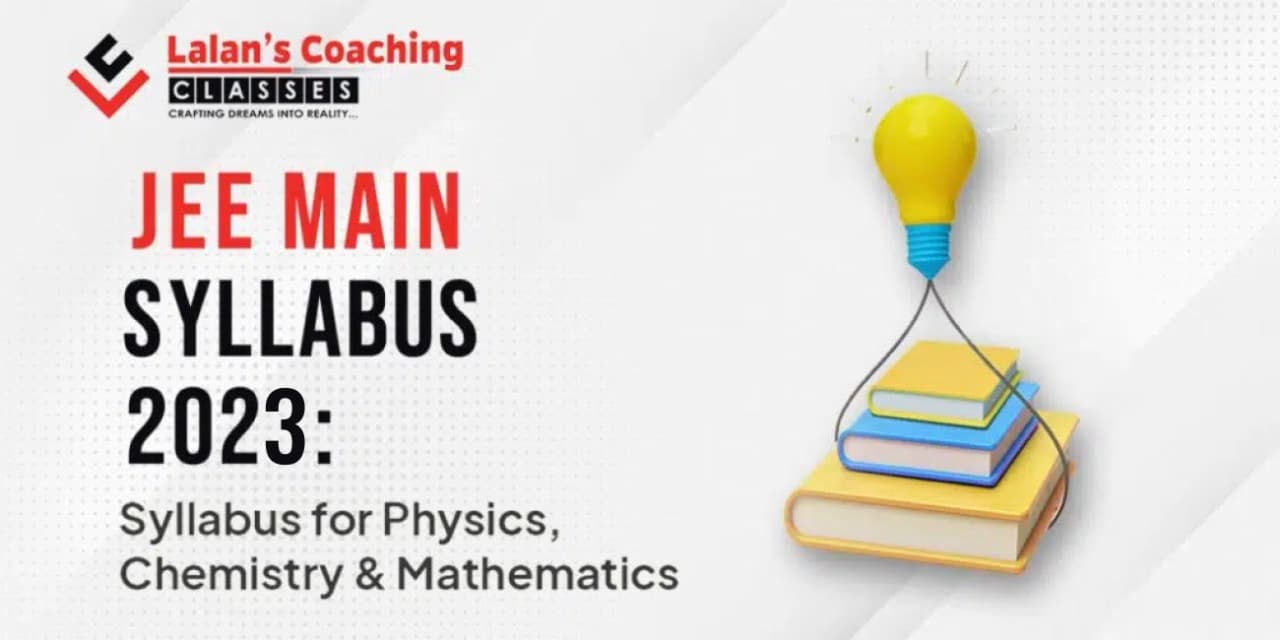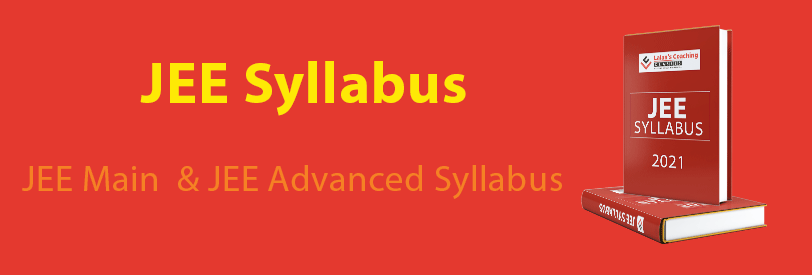Table of Contents
ToggleSYLLABUS FOR JEE 2023 (Main + Advanced)

The official notification for JEE Main 2023 will be released by the NTA on their official website at jeemain.nta.nic.in. The syllabus for JEE Main 2023 will help aspirants to prepare well for their exams.
The syllabus for JEE Main 2023 will be going to release for both B.e/B. tech Paper 1 & B.arch/B.plan Paper 2. Also, go through for Official JEE Exam pattern for better understanding, and to for deep ideas goes through with JEE Main Previous Year Question Papers.
Syllabus For JEE Main 2023 (Mathematics, Chemistry & Physics).
For a brief understanding refer to Class 12th NCERT Solution & Solution for 11th NCERT.
Syllabus For JEE Main Physics 2023:
JEE Main 2023 physics syllabus is the same as the previous year. New candidates can prepare directly by solving the previous year’s physics question paper for a better understanding of question patterns. Students can mainly focus the topics like Magnetism, Mechanics, and Electricity which consist of 65% Marks.
Here we listed a very important Physics chapter for JEE Main 2023:
Section A (80% Marks)
- Physics and measurement
- Rotational motion
- Thermodynamics
- Kinematics
- Work, energy, and power
- Properties of solids and liquids
- Gravitation
- Laws of Motion
- Oscillations and waves
- Electronic devices
- Kinetic theory of gases
- Current electricity
- Communication systems
- Electromagnetic induction and alternating currents
- Magnetic effects of current and magnetism
- Optics
- Electromagnetic waves
- Atoms and nuclei
- Electrostatics
- Dual nature of matter and radiation
Section B (20% Marks)
Experimental Skills
Syllabus For JEE Main Mathematics 2023:
Students can easily score good score in maths by simply understanding the numerical concepts and sharing the concept building skills.
Here we listed a very important mathematics chapter for JEE Main 2023:
Three-dimensional geometry
Differential equations
Binomial Theorem and its simple application
Complex numbers and quadratic equations
Sets, relations & Functions
Limit, continuity & differentiability
Integral calcus
Mathematical Reasoning
Mathematical Induction
Matrics and Determinants
Complex numbers and quadratic equations.
Vector algebra
Trigonometry
Statistics & Probability
Co-ordinate geometry
Sequence and series
Syllabus For JEE Main Chemistry 2023:
Chemistry is the only very divergent subject that is divided into three parts i.e Physical chemistry, Organic chemistry, and inorganic chemistry. Here we list all sections of the chemistry syllabus of JEE Main 2023. Do go thoroughly from every topic to excel in your exams.
- Some basic concepts in chemistry
- Solutions
- Chemical kinetics
- chemical thermodynamics
- chemical bonding and molecular structure
- Atomic Structure
- Redox reactions and electrochemistry
- Surface chemistry
- Chemical Kinetics
- States of matter
- Chemistry in everyday life
- Principle related to practical chemistry
- Hydrocarbons
- Purification and characterization of organic compounds.
- Organic compounds containing oxygen
- Organic compounds containing halogens
- Organic compounds containing nitrogen
- Some basic principles of organic chemistry
- Polymers
- Bio-molecules
- General principles and process of isolation
- Environmental Chemistry
- d- and f block elements
- Co-ordination Compounds
- Hydrogen
- P Block elements group 13 to group 18 Elements
- Block elements (alkali and alkaline earth metals)
- Classification of elements and periodicity in properties
Syllabus For JEE Main 2023 Part 2 Aptitude Test (B.arch/B.planning)
Part I
Awareness of persons, places, Buildings, Materials. Objects, Texture related to Architecture and build—environment. Visualizing three-dimensional objects from two-dimensional drawings. Visualizing. different sides of three-dimensional objects. Analytical Reasoning Mental Ability (Visual, Numerical, and Verbal).
Part II
Three-dimensional – perception: Understanding and appreciation of scale and proportion of objects, building forms, and elements, color texture, harmony, and contrast. Design and drawing of geometrical or abstract shapes and patterns in pencil.
Transformation of forms both 2 D and 3 D union, subtraction, rotation, development of surfaces and volumes, Generation of Plan, elevations, and 3 D views of objects. Creating two-dimensional and three-dimensional compositions using given shapes and forms.
Sketching of scenes and activities from memory of urbanscape (public space, market, festivals, street scenes, monuments, recreational spaces, etc.), landscape (river fronts, jungles, trees, plants, etc.), and rural life.
Part III (Planning)
General Awareness regarding development issues, government programs/schemes, etc., Comprehension, critical thinking, analytical skills, graphs, charts and map reading skills, simple statistics, CBSE class X Social Sciences topics.
Sketching of scenes and activities from memory of urbanscape (public space, market, festivals, street scenes, monuments, recreational spaces, etc.), landscape (river fronts, jungles, trees, plants, etc.), and rural life.
JEE Main 2023 Exam Pattern
While preparing for the entrance examination, the candidates are advised to check the official exam pattern along with the syllabus of JEE Main 2023. Details about how the entrance examination will be conducted and information related to the features such as duration, language, number of questions, marking scheme, and more will be known through the previous year’s JEE Main exam format.
JEE Main Exam Pattern 2023 – Paper 1
Parameters
JEE Main 2023 Exam Pattern Details
Exam Mode: Online test mode
Exam Duration:3 hours (4 hours for persons with benchmark disabilities)
Subjects: Physics, Chemistry, and Mathematics
A total number of questions:
90 (need to answer 75 questions) (Each subject will have 20 Multiple Choice Questions and 10 numerical questions out of which 5 is a must)
Type of Questions:
20 Objective questions having 4 options each with only 1 correct option
10 Numerical questions out of which 5 need to be answered
JEE Main 2023 Marking Scheme
JEE Main Marking Scheme for Paper 1 is-
For MCQs – 4 Marks will be awarded for every correct answer and 1 Mark will be deducted for every incorrect answer
For an answer with a numeric value – 4 Marks will be awarded for every correct answer and 0 Marks will be deducted for every incorrect answer
JEE Main Maximum Marks:300 Marks
Medium of paper: English or Hindi
NTA JEE Main 2023 Paper 2 Exam Pattern
Particulars
JEE Main Exam Pattern Details
Mode of Examination: Online Exam except for Drawing section in B.Arch
Language of Examination: English or Hindi – For All Centre Cities
English or Hindi or Gujarati- For Centre Cities in Gujarat, Dadra & Nagar Haveli and Daman & Diu
Duration of Examination: 3 hours
Number of Sections
There are three sections in both B. Arch and B.Plan papers.
B.Arch:
- Mathematics
- Aptitude test
- Drawing test
B.Plan:
- Mathematics
- Aptitude test
- Planning test
Type of Questions
B.Arch- Type of questions for each section of B.Arch-
- Mathematics- MCQ and questions with numerical value as answers
- Aptitude- MCQ
- Drawing- Drawing aptitude
B.Planning- Type of questions for each section of B.Planning-
- Mathematics- MCQ and questions with numerical value as answers
- Aptitude- MCQ
- Planning- MCQ
Number of Questions:-
B.Arch: 77 Questions
B.Plan: 100 Questions
Total Marks:-
400 Marks
Marking Scheme
JEE Main Marking Scheme for Paper 2 is-
- MCQs- Candidates will be awarded 4 marks for each correct answer and there will be a negative marking of 1 mark on each incorrect answer.
- Questions with numerical value answers – Candidates will be awarded 4 marks for each correct answer and there will be no negative marking.
- Marking Scheme for Drawing Test – Two questions are evaluated out of 100 marks

JEE MAIN SYLLABUS 2023 KEY POINT
JEE Syllabus 2023 is one of the most important things that students should get their hands on and undergo during their JEE prep.
The syllabus includes a lot of information such as details of the vital chapters and subjects to concentrate on, weightage of symbols, key objectives of the whole JEE course, reference materials, and much more. Therefore, getting a complete overview of this IIT JEE syllabus can help candidates not only study productively but also be one step ahead in the contest.
Following the syllabus is among the important exercises. Moreover, as the syllabus of JEE Main 2023 is immense, candidates must further develop a suitable timetable to cover all of the vital topics well before the final day of the examination. Meanwhile, the IIT Joint Entrance Exam is one of the most challenging competitive assessments for Engineering. Aside from working hard pupils ought to be wise and plan everything carefully. They should develop a correct prep strategy after going through JEE’s syllabus and after that study without becoming distracted.
How Important is JEE Syllabus?
The first thing that aspirants should take while starting their preparation of IIT JEE is to go through the syllabus.
The syllabus is a significant part of document that may broadly encourage applicants to clear their doubts and help them learn. Usually, the syllabus consists of all of the essential directions and it also lists out all the subjects and theories where the questions will probably be put in the final examination.
Candidates should at least go through the syllabus once rather than dismissing it completely. Knowing the topics that are very likely to arise in the examination will help them prepare strongly and perform well in the examinations.
Overall, it is going to be valuable in the long run. Simultaneously, knowing the syllabus doesn’t mean only seeing the subjects; instead it is all about reviewing and analyzing all of the topics thoroughly.
- Yet, some of the key benefits of the syllabus are:
It provides a chance to create a well-defined groundwork strategy. - The syllabus aids in getting better control over each candidates’ learning.
- They can select what to find out. IIT JEE syllabus provides a fair comprehension of important theories and marking the plot of chapters further allowing them to concentrate more on the relevant subjects.
- It helps to comprehend the question paper format such as the kinds of questions, newspaper length and much more.
- The syllabus also includes details about materials that may enhance candidates studying.
- The majority of the time, the syllabus may even cite reference research materials that candidates can take advantage of to enlarge their understanding further.
